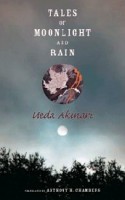 Author: Ueda Akinari
Author: Ueda Akinari
Translator: Anthony H. Chambers
Publisher: Columbia University Press
ISBN: 9780231139137
Released: December 2008
Original release: 1776
Awards: Japan-U.S. Friendship Commission Prize
Ueda Akinari’s Ugetsu monogatari is a collection of nine short stories of ghosts and the occult that was originally published in Japan in 1776. The classic as a whole has been translated into English several times and some of the individual tales have been translated as many as ten. The most recent of these translations is a study by Anthony H. Chambers first published in 2007 by Columbia University Press as part of its series Translation from the Asian Classics. With his translation of Ugetsu monogatari, titled Tales of Moonlight and Rain, Chambers aimed to provide th most accurate, comprehensive, and faithful English edition of the work, conveying the meaning of the text while still capturing Akinari’s tone and style of writing. His efforts were rewarded with the 2007 Japan-U.S. Friendship Commission Prize for the Translation of Japanese Literature. The particular reason that Tales of Moonlight and Rain was brought to my attention was that Akinari was noted as being one of Yukio Mishima’s favorite authors in his biography, Persona.
The nine stories in Tales of Moonlight and Rain–“Shiramine,” “The Chrysanthemum Vow,” “The Reed-Choked House,” ” The Carp of My Dreams,” “The Owl of the Three Jewels,” “The Kibitsu Cauldron,” “The Serpent’s Lust,” “The Blue Hood,” and “On Poverty and Wealth”–all deal with the mysterious and the strange. Ghosts make frequent appearances, demons cause terror and strife, spirits seek revenge, people are cursed or succumb to possession, and so on. All of the stories are set in provincial Japan which, as Chambers note in the introduction, would emphasize the strangeness and otherness of the tales for Akinari’s original audience, a group mostly made up of people who lived in Japan’s major cities. Additionally, all but one of the stories takes place before the Tokugawa shogunate was established in 1603, which also had a distancing effect. Today’s readers are even further separated from the stories in Tales of Moonlight and Rain, but the tales are no less fascinating because of it.
In addition to Akinari’s nine stories, Tales of Moonlight and Rain also includes extensive notes and analysis as well as a bibliography listing texts and commentaries, secondary resources, and previous English translations of Akinari’s work. Chambers has written a lengthy introduction to the collection as a whole, but each of the stories has its own prefatory material which notes important details regarding the titles, characters, places, and time periods, explains useful background information and the stories’ relationships and affinities to other works (both classic and contemporary), and provides additional commentary and any other observations. Chambers uses both footnotes and endnotes in Tales of Moonlight and Rain–the footnotes for points critical to the immediate understanding of the text and the endnotes for more in-depth information. In theory, this is an excellent idea, but in practice I found it rather annoying and cumbersome to have to look in two different places for the stories’ notes. But this is really my only complaint about the volume and I consider it a minor one.
One of the most interesting things for me about the stories in Tales of Moonlight and Rain were all of the references and allusions that the collection contained to other classic works of Chinese and Japanese literature such as Murasaki Shikibu’s The Tale of Genji and the collection of poetry Manyōshū. Having read translations of some of the older works being referred to, I particularly appreciated Akinari’s use of them in Tales of Moonlight and Rain. However, it is not at all necessary to be familiar with the Chinese and Japanese literary classics in order to enjoy the collection. All of the stories stand completely on their own despite the borrowing and adapting that Akinari employs. I didn’t realize it before reading Tales of Moonlight and Rain, but I was actually already familiar with some of the adaptations of Akinari’s own work; Ugetsu monogatari was more influential than I knew. Personally, I enjoyed the entirety of Tales of Moonlight and Rain a great deal, including Chambers’ commentary and analysis. The stories may be more than two centuries old, but perhaps in part because of that they remain both evocative and spellbinding.